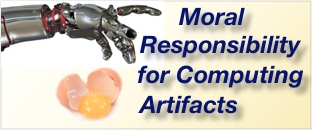
A Short History of "The Rules"
The Poynter Center for the Study of Ethics and American Institutions held a workshop on 3-4 March 2010. The official title was "Ethical Guidance for Research and Application of Pervasive and Autonomous Information Technology," but most of us called it "PAIT." The workshop was supported by the National Science Foundation (grant number SES-0848097).
Ken Pimple of the Poynter Center was the director of the workshop, and Brian Schrag, also of the Center, was the co-director. The workshop was held in Cincinatti just prior to the APPE's annual meeting. Over 40 people were involved in the PAIT workshop.
During the meeting, Ken suggested a set of principles that could be used to better understand PAIT. Ken challenged participants to continue to work together on issues raised during the workshop, even after the workshop was over. One of the issues singled out for continued work was establishing a set of principles for PAIT.
Keith Miller was one of the participants interested in working on principles. However, Keith thought that establishing principles for computing artifacts in general (not just PAIT) was necessary before more specific principles for PAIT could be established. To that end, Keith starting writing what he hoped would be a short document, entitled "Moral Responsibility for Computing Artifacts." Early on, he asked Deborah Johnson, Chuck Huff and Joe Herkert (all of whom attended PAIT) for their opinions on the first drafts. Not long after the PAIT workshop, Keith sent a draft of what he joking called the "manifesto" (a joke that referenced the Manifesto for Agile Software Development) to Ken.
For several months, the number of people adding suggestions to various drafts of the document grew slowly. By May 2010, in addition to Chuck, Deborah, Joe, Ken and Keith, the group included Colin Allen, Helen Nissenbaum, Noel Sharkey and Wendell Wallach (all of whom attended PAIT) and Jim Moor. On 30 May 2010, Keith sent out Version 19 of the document to the entire list of PAIT attendees. and on 28 July 2010 Keith sent out Version 22 to 77 people, many of whom had not attended PAIT. The plan is to allow the document to evolve as more and more people are invited to comment on the document, and to "sign on."
Following Ken's lead, the first document tried to set out "principles" for moral responsibility for computing artifacts. The first version had two principles. The next version talked about "rules" instead of principles, and there were three rules. The current version as I write this (Version 23) includes five rules.
In addition to the rules and their explanation, the document includes "meta-rules" about how the document can change. The document is designed to be a continuing work-in-progress, under the control of people willing to sign on to the document. The process uses a "coordinator," at the moment Keith, who is in charge of receiving suggestions for changes, combining these suggestions into new versions, and sending the versions out to the people currently "signed on." In order to simplify citations to the document, the "signers" are now called "The Ad Hoc Committee on Responsible Computing."
By the nature of their work, academics in general and philosophers in particular do not always empahsize things on which they agree. This document started as an attempt to go against that trend, at least for a moment, in order to make what we hope is a useful statement about the moral responsibility for computing artifacts. We welcome the participation of all interested people, including engineers, scientists, and anyone who uses computing artifacts.
Keith W. Miller, 31 July 2010.
The names of the signers of the current document, as well as several versions of The Rules, are available at https://computerethics.online/TheRules/.
The Rules will be featured at:
The Rules have been mentioned in the following: